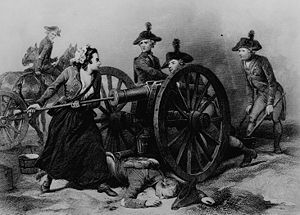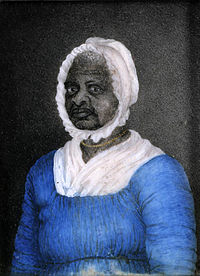Women in the American Revolution
Halting previously everyday activities, such as drinking British tea or ordering clothes from Britain, demonstrated colonial opposition during the years leading up to and during the war.
[3] Women played a major role in this method of defiance by denouncing silks, satins, and other luxuries in favor of homespun clothing generally made in spinning and quilting bees, sending a strong message of colonial unity to the British government.
While the Boston Tea Party of 1773 is the most widely recognized manifestation of this boycott, it is important to note that for years previous to that explosive action, Patriot women had been refusing to consume that very same British product as a political statement.
Also, frugality (a lauded feminine virtue before the years of the Revolution) likewise became a political statement as households were asked to contribute to the wartime efforts.
[8] Mercy Otis Warren wrote scathing satirical plays that damaged the reputations of local Crown officials such as Governor Thomas Hutchinson and attorney general Jonathan Sewall.
Women joined up with army regiments for various reasons: fear of starvation, rape, loneliness, and imminent poverty- either as a last resort or following their husbands.
[16] Deborah Samson served in the Continental Army as Private Robert Shurtleff for over a year; when her gender was discovered, she was honorably discharged and granted a veteran's pension by the state of Massachusetts.
[19] Some women fought in combat without leaving home; for example, Nancy Hart of Georgia reportedly shot two Loyalist soldiers in her kitchen, and held several others at gunpoint until help arrived.
[22] Other Patriot women concealed army dispatches and letters containing sensitive military information underneath their petticoats as they rode through enemy territory to deliver it.
Deborah Sampson,[23] Harriet Prudence Patterson Hall,[24] and Lydia Darragh[25] all managed to sneak important information past the British to their American compatriots.
[24] On the night of April 26, 1777, sixteen-year-old Sybil Ludington is said to have ridden 40 miles through the villages of Putnam County, New York, knocking on farmhouse doors to warn militiamen that British troops were on their way to Danbury, Connecticut.
[26] She has received widespread recognition as the female Paul Revere; a report in The New England Quarterly says there is little evidence backing the story,[27] and whether the ride occurred is questioned.
Alongside being a member of the Mid-Atlantic Writing Circle, she was the only woman to join the American Whig Society, for which she guarded sensitive documents during the war.
[32] Although the American Revolution is famous for its rhetoric of liberty and equality, one of the most downtrodden groups in the soon-to-be United States is all but forgotten in contemporary scholarship.
[38] From his warship off the coast of Virginia, the governor issued a proclamation, which declared martial law and offered freedom for "all indentured servants, Negroes, and others...that are able and willing to bear arms.
"[39] Like the 1775 House of Commons proposal, Dunmore's Proclamation was intended to scare the white slaveholders of Virginia and to encourage black slaves to abandon their masters, instead of being born out of abolitionist sentiments.
[44] In June 1776, General Henry Clinton similarly promised that any slave who fled to a British camp would have "full security to follow within these Lines, any occupation which he shall think proper.
However, George Washington was initially reluctant to encourage slaves to fight in exchange for freedom because of racially-based objections and because he feared numerous black recruits that he could not control.
They made up the bulk of the workforce that built and repaired the fortifications used during the sieges of Savannah, Charleston, and other low country towns and cities, and were similarly promised freedom for their service.
Most free urban blacks in the North were employed in "service trades," including cooking and catering, cleaning stables, cutting hair and driving coaches.
For example, in the Chesapeake region, agricultural and economic patterns changed after the war, with many planters moving away from labor-intensive tobacco as a cash crop and diversifying their plantings.
Following the war, significant numbers of African American women and men relocated to Nova Scotia and the British West Indies.
For example, enslaved women living in Philadelphia, rather than waiting for their husbands to return from fighting for the colonists, left with the British who progressively departed in the early 1780s.
These African American women moved of their own accord to Great Britain, Nova Scotia, and the West Indies –in search of a better life.
A few exceptions include Phillis Wheatley, an enslaved woman in Boston who became the first African American published poet; Mammy Kate of Georgia, who saved the life of Stephen Heard by smuggling him out of a British prison in a laundry basket; and Sally St. Clair of South Carolina, a woman of African and French ancestry,[17] who passed as a man and served as a gunner in the Continental Army until she was killed in action during the siege of Savannah.
As the American Revolutionary War drew near, most British Army units were stationed in New York and Boston, leaving the western frontier devoid of any military authority.
The nation started to trade with settlers in household goods made by Catawba women, who turned traditional crafts into a profitable business.
Its location gave it little choice in the matter; Superintendent of Southern Indians John Stuart observed in 1775, "they are domiciliated and dispersed thro' the Settlements of north and South Carolina."
Overall, however, the Catawba's role in the war has been termed "rather negligible"; with so few men to commit to the cause, it does seem unlikely that the nation determined the outcome of any battle.
While their alliance with the Patriots helped them fit into a rapidly changing environment—in 1782, the state legislature sent the nation five hundred bushels of corn to tide them over until summer and both paid them for their service in the army and reimbursed them for the livestock they had supplied—the settler's temporarily favorable impression of the Catawba did not guarantee a secure future.




